Contract Law Case Study: Issues of Agreement, Mistake, Breach
VerifiedAdded on 2022/11/13
|11
|2544
|345
Case Study
AI Summary
This document presents a detailed analysis of a contract law case study. The scenario involves a restaurant owner, Johnny, and various customers. The analysis addresses whether a valid contract was formed between Johnny and a customer named Li, considering issues of offer, acceptance, and consideration. It then explores the concept of mistake, specifically unilateral mistake, in relation to the pricing of menu items. Finally, it examines the consequences of a breach of contract, should the restaurant fail to provide the premises for a wedding, and the potential damages Li could claim. The analysis incorporates relevant legal principles and case law to support its conclusions, addressing elements of contract formation, vitiating factors, and remedies for breach.
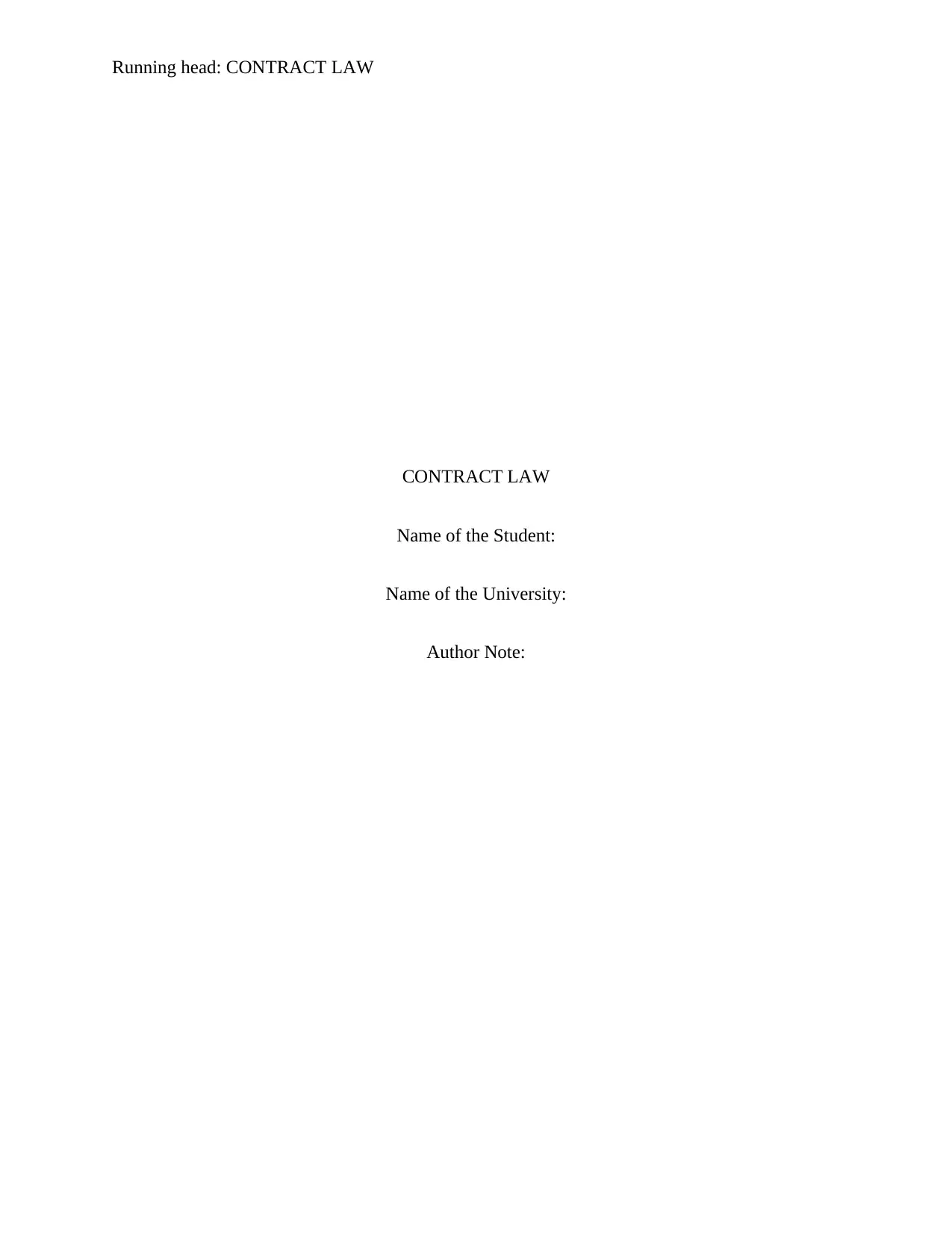
Running head: CONTRACT LAW
CONTRACT LAW
Name of the Student:
Name of the University:
Author Note:
CONTRACT LAW
Name of the Student:
Name of the University:
Author Note:
Paraphrase This Document
Need a fresh take? Get an instant paraphrase of this document with our AI Paraphraser
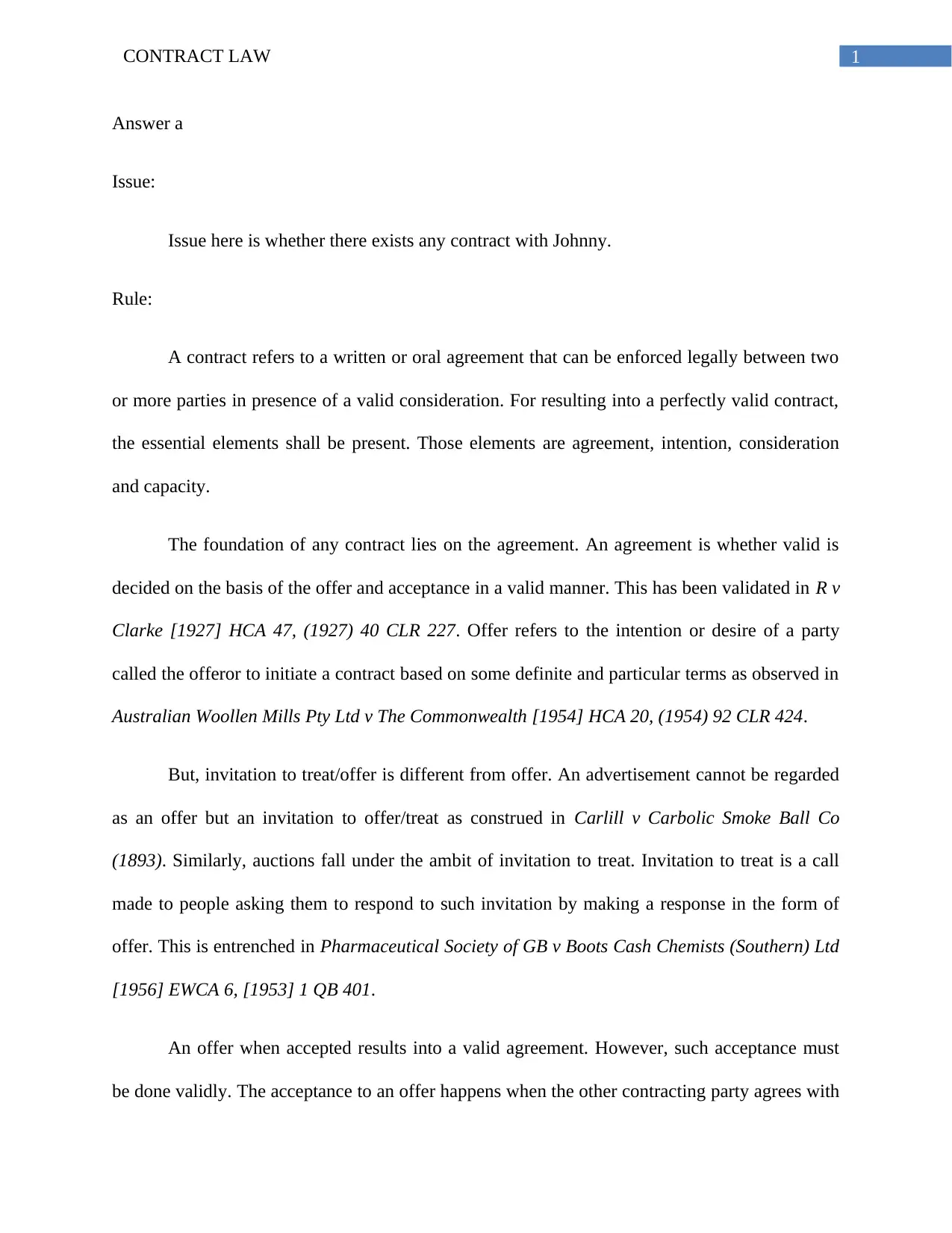
1CONTRACT LAW
Answer a
Issue:
Issue here is whether there exists any contract with Johnny.
Rule:
A contract refers to a written or oral agreement that can be enforced legally between two
or more parties in presence of a valid consideration. For resulting into a perfectly valid contract,
the essential elements shall be present. Those elements are agreement, intention, consideration
and capacity.
The foundation of any contract lies on the agreement. An agreement is whether valid is
decided on the basis of the offer and acceptance in a valid manner. This has been validated in R v
Clarke [1927] HCA 47, (1927) 40 CLR 227. Offer refers to the intention or desire of a party
called the offeror to initiate a contract based on some definite and particular terms as observed in
Australian Woollen Mills Pty Ltd v The Commonwealth [1954] HCA 20, (1954) 92 CLR 424.
But, invitation to treat/offer is different from offer. An advertisement cannot be regarded
as an offer but an invitation to offer/treat as construed in Carlill v Carbolic Smoke Ball Co
(1893). Similarly, auctions fall under the ambit of invitation to treat. Invitation to treat is a call
made to people asking them to respond to such invitation by making a response in the form of
offer. This is entrenched in Pharmaceutical Society of GB v Boots Cash Chemists (Southern) Ltd
[1956] EWCA 6, [1953] 1 QB 401.
An offer when accepted results into a valid agreement. However, such acceptance must
be done validly. The acceptance to an offer happens when the other contracting party agrees with
Answer a
Issue:
Issue here is whether there exists any contract with Johnny.
Rule:
A contract refers to a written or oral agreement that can be enforced legally between two
or more parties in presence of a valid consideration. For resulting into a perfectly valid contract,
the essential elements shall be present. Those elements are agreement, intention, consideration
and capacity.
The foundation of any contract lies on the agreement. An agreement is whether valid is
decided on the basis of the offer and acceptance in a valid manner. This has been validated in R v
Clarke [1927] HCA 47, (1927) 40 CLR 227. Offer refers to the intention or desire of a party
called the offeror to initiate a contract based on some definite and particular terms as observed in
Australian Woollen Mills Pty Ltd v The Commonwealth [1954] HCA 20, (1954) 92 CLR 424.
But, invitation to treat/offer is different from offer. An advertisement cannot be regarded
as an offer but an invitation to offer/treat as construed in Carlill v Carbolic Smoke Ball Co
(1893). Similarly, auctions fall under the ambit of invitation to treat. Invitation to treat is a call
made to people asking them to respond to such invitation by making a response in the form of
offer. This is entrenched in Pharmaceutical Society of GB v Boots Cash Chemists (Southern) Ltd
[1956] EWCA 6, [1953] 1 QB 401.
An offer when accepted results into a valid agreement. However, such acceptance must
be done validly. The acceptance to an offer happens when the other contracting party agrees with
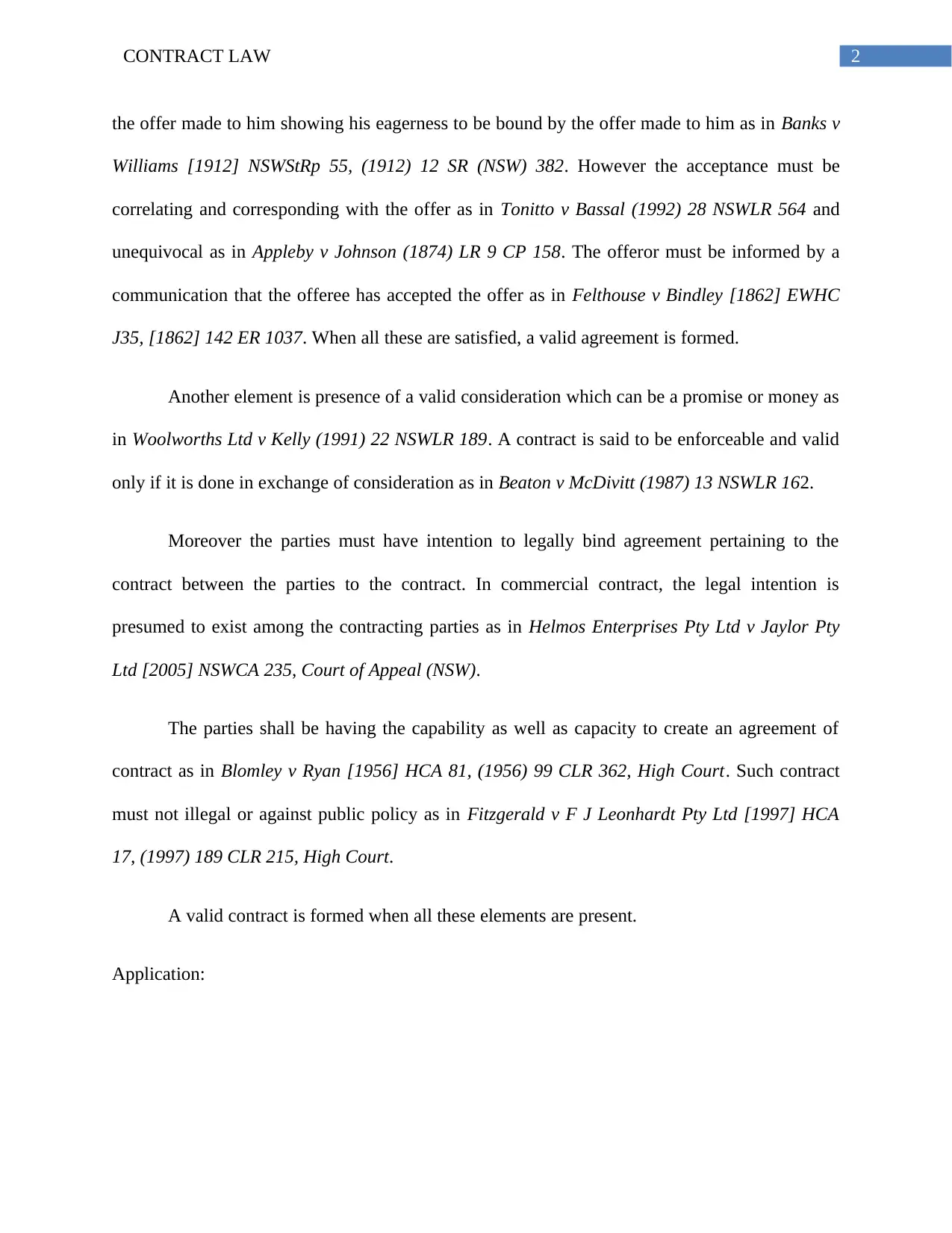
2CONTRACT LAW
the offer made to him showing his eagerness to be bound by the offer made to him as in Banks v
Williams [1912] NSWStRp 55, (1912) 12 SR (NSW) 382. However the acceptance must be
correlating and corresponding with the offer as in Tonitto v Bassal (1992) 28 NSWLR 564 and
unequivocal as in Appleby v Johnson (1874) LR 9 CP 158. The offeror must be informed by a
communication that the offeree has accepted the offer as in Felthouse v Bindley [1862] EWHC
J35, [1862] 142 ER 1037. When all these are satisfied, a valid agreement is formed.
Another element is presence of a valid consideration which can be a promise or money as
in Woolworths Ltd v Kelly (1991) 22 NSWLR 189. A contract is said to be enforceable and valid
only if it is done in exchange of consideration as in Beaton v McDivitt (1987) 13 NSWLR 162.
Moreover the parties must have intention to legally bind agreement pertaining to the
contract between the parties to the contract. In commercial contract, the legal intention is
presumed to exist among the contracting parties as in Helmos Enterprises Pty Ltd v Jaylor Pty
Ltd [2005] NSWCA 235, Court of Appeal (NSW).
The parties shall be having the capability as well as capacity to create an agreement of
contract as in Blomley v Ryan [1956] HCA 81, (1956) 99 CLR 362, High Court. Such contract
must not illegal or against public policy as in Fitzgerald v F J Leonhardt Pty Ltd [1997] HCA
17, (1997) 189 CLR 215, High Court.
A valid contract is formed when all these elements are present.
Application:
the offer made to him showing his eagerness to be bound by the offer made to him as in Banks v
Williams [1912] NSWStRp 55, (1912) 12 SR (NSW) 382. However the acceptance must be
correlating and corresponding with the offer as in Tonitto v Bassal (1992) 28 NSWLR 564 and
unequivocal as in Appleby v Johnson (1874) LR 9 CP 158. The offeror must be informed by a
communication that the offeree has accepted the offer as in Felthouse v Bindley [1862] EWHC
J35, [1862] 142 ER 1037. When all these are satisfied, a valid agreement is formed.
Another element is presence of a valid consideration which can be a promise or money as
in Woolworths Ltd v Kelly (1991) 22 NSWLR 189. A contract is said to be enforceable and valid
only if it is done in exchange of consideration as in Beaton v McDivitt (1987) 13 NSWLR 162.
Moreover the parties must have intention to legally bind agreement pertaining to the
contract between the parties to the contract. In commercial contract, the legal intention is
presumed to exist among the contracting parties as in Helmos Enterprises Pty Ltd v Jaylor Pty
Ltd [2005] NSWCA 235, Court of Appeal (NSW).
The parties shall be having the capability as well as capacity to create an agreement of
contract as in Blomley v Ryan [1956] HCA 81, (1956) 99 CLR 362, High Court. Such contract
must not illegal or against public policy as in Fitzgerald v F J Leonhardt Pty Ltd [1997] HCA
17, (1997) 189 CLR 215, High Court.
A valid contract is formed when all these elements are present.
Application:
⊘ This is a preview!⊘
Do you want full access?
Subscribe today to unlock all pages.

Trusted by 1+ million students worldwide
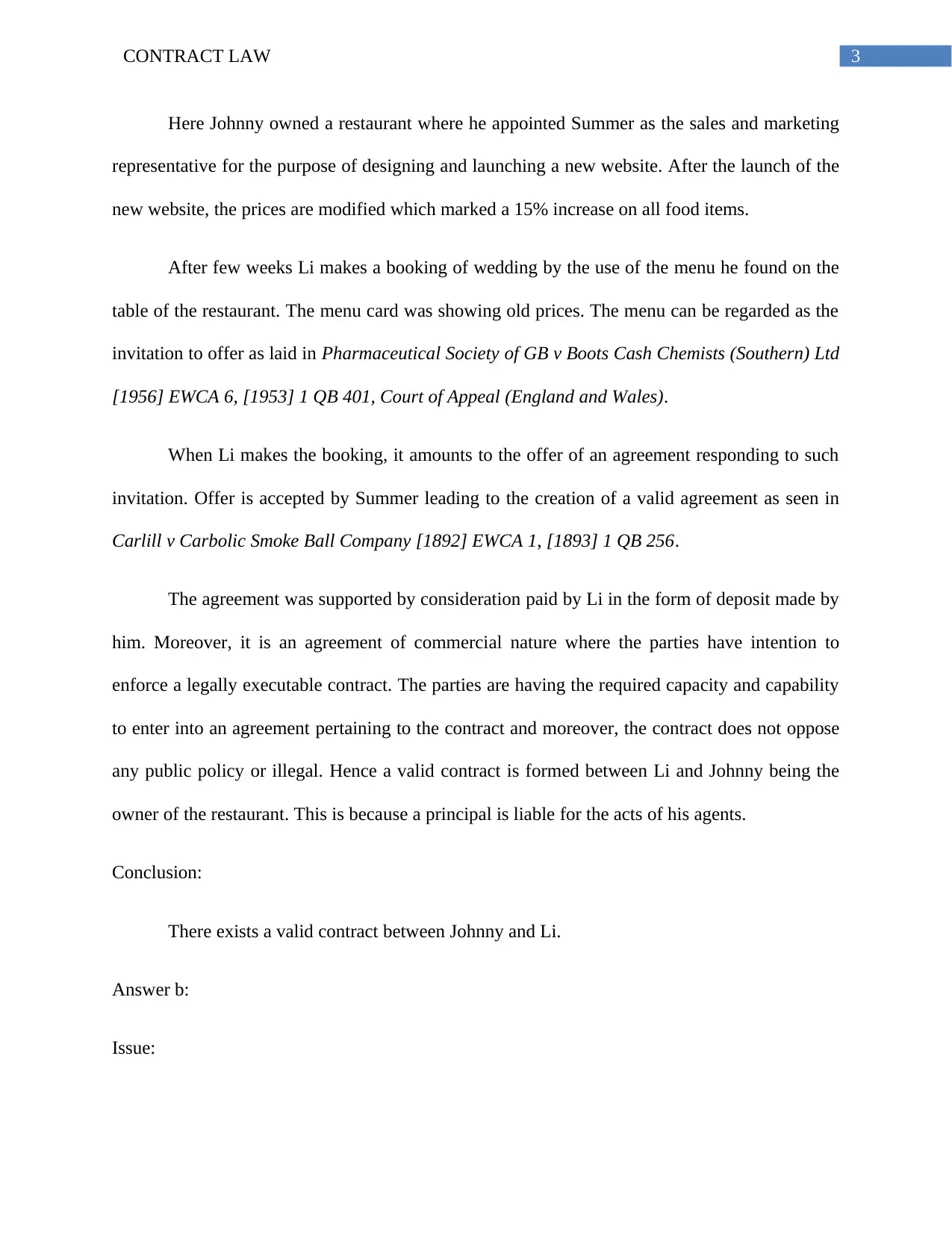
3CONTRACT LAW
Here Johnny owned a restaurant where he appointed Summer as the sales and marketing
representative for the purpose of designing and launching a new website. After the launch of the
new website, the prices are modified which marked a 15% increase on all food items.
After few weeks Li makes a booking of wedding by the use of the menu he found on the
table of the restaurant. The menu card was showing old prices. The menu can be regarded as the
invitation to offer as laid in Pharmaceutical Society of GB v Boots Cash Chemists (Southern) Ltd
[1956] EWCA 6, [1953] 1 QB 401, Court of Appeal (England and Wales).
When Li makes the booking, it amounts to the offer of an agreement responding to such
invitation. Offer is accepted by Summer leading to the creation of a valid agreement as seen in
Carlill v Carbolic Smoke Ball Company [1892] EWCA 1, [1893] 1 QB 256.
The agreement was supported by consideration paid by Li in the form of deposit made by
him. Moreover, it is an agreement of commercial nature where the parties have intention to
enforce a legally executable contract. The parties are having the required capacity and capability
to enter into an agreement pertaining to the contract and moreover, the contract does not oppose
any public policy or illegal. Hence a valid contract is formed between Li and Johnny being the
owner of the restaurant. This is because a principal is liable for the acts of his agents.
Conclusion:
There exists a valid contract between Johnny and Li.
Answer b:
Issue:
Here Johnny owned a restaurant where he appointed Summer as the sales and marketing
representative for the purpose of designing and launching a new website. After the launch of the
new website, the prices are modified which marked a 15% increase on all food items.
After few weeks Li makes a booking of wedding by the use of the menu he found on the
table of the restaurant. The menu card was showing old prices. The menu can be regarded as the
invitation to offer as laid in Pharmaceutical Society of GB v Boots Cash Chemists (Southern) Ltd
[1956] EWCA 6, [1953] 1 QB 401, Court of Appeal (England and Wales).
When Li makes the booking, it amounts to the offer of an agreement responding to such
invitation. Offer is accepted by Summer leading to the creation of a valid agreement as seen in
Carlill v Carbolic Smoke Ball Company [1892] EWCA 1, [1893] 1 QB 256.
The agreement was supported by consideration paid by Li in the form of deposit made by
him. Moreover, it is an agreement of commercial nature where the parties have intention to
enforce a legally executable contract. The parties are having the required capacity and capability
to enter into an agreement pertaining to the contract and moreover, the contract does not oppose
any public policy or illegal. Hence a valid contract is formed between Li and Johnny being the
owner of the restaurant. This is because a principal is liable for the acts of his agents.
Conclusion:
There exists a valid contract between Johnny and Li.
Answer b:
Issue:
Paraphrase This Document
Need a fresh take? Get an instant paraphrase of this document with our AI Paraphraser
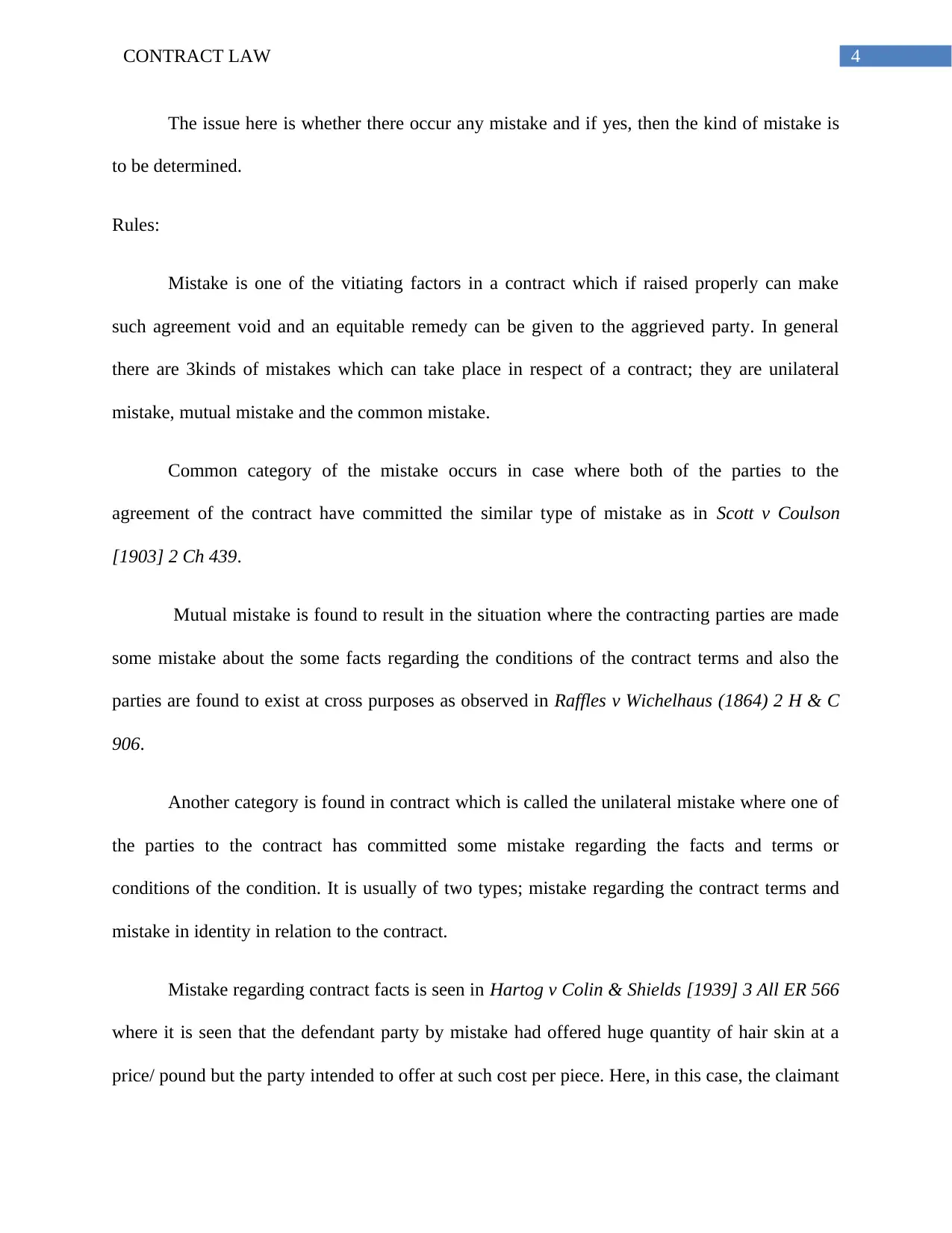
4CONTRACT LAW
The issue here is whether there occur any mistake and if yes, then the kind of mistake is
to be determined.
Rules:
Mistake is one of the vitiating factors in a contract which if raised properly can make
such agreement void and an equitable remedy can be given to the aggrieved party. In general
there are 3kinds of mistakes which can take place in respect of a contract; they are unilateral
mistake, mutual mistake and the common mistake.
Common category of the mistake occurs in case where both of the parties to the
agreement of the contract have committed the similar type of mistake as in Scott v Coulson
[1903] 2 Ch 439.
Mutual mistake is found to result in the situation where the contracting parties are made
some mistake about the some facts regarding the conditions of the contract terms and also the
parties are found to exist at cross purposes as observed in Raffles v Wichelhaus (1864) 2 H & C
906.
Another category is found in contract which is called the unilateral mistake where one of
the parties to the contract has committed some mistake regarding the facts and terms or
conditions of the condition. It is usually of two types; mistake regarding the contract terms and
mistake in identity in relation to the contract.
Mistake regarding contract facts is seen in Hartog v Colin & Shields [1939] 3 All ER 566
where it is seen that the defendant party by mistake had offered huge quantity of hair skin at a
price/ pound but the party intended to offer at such cost per piece. Here, in this case, the claimant
The issue here is whether there occur any mistake and if yes, then the kind of mistake is
to be determined.
Rules:
Mistake is one of the vitiating factors in a contract which if raised properly can make
such agreement void and an equitable remedy can be given to the aggrieved party. In general
there are 3kinds of mistakes which can take place in respect of a contract; they are unilateral
mistake, mutual mistake and the common mistake.
Common category of the mistake occurs in case where both of the parties to the
agreement of the contract have committed the similar type of mistake as in Scott v Coulson
[1903] 2 Ch 439.
Mutual mistake is found to result in the situation where the contracting parties are made
some mistake about the some facts regarding the conditions of the contract terms and also the
parties are found to exist at cross purposes as observed in Raffles v Wichelhaus (1864) 2 H & C
906.
Another category is found in contract which is called the unilateral mistake where one of
the parties to the contract has committed some mistake regarding the facts and terms or
conditions of the condition. It is usually of two types; mistake regarding the contract terms and
mistake in identity in relation to the contract.
Mistake regarding contract facts is seen in Hartog v Colin & Shields [1939] 3 All ER 566
where it is seen that the defendant party by mistake had offered huge quantity of hair skin at a
price/ pound but the party intended to offer at such cost per piece. Here, in this case, the claimant
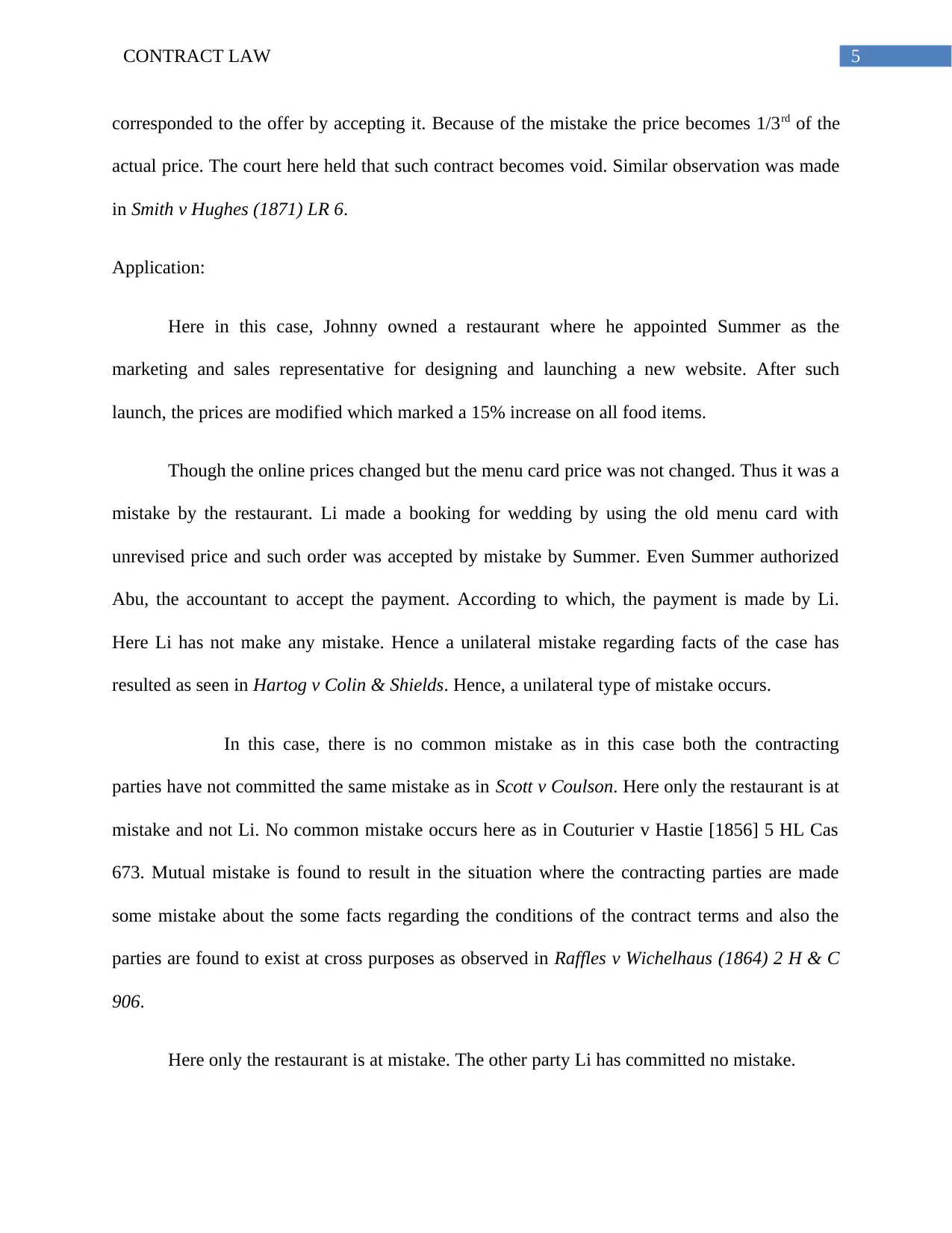
5CONTRACT LAW
corresponded to the offer by accepting it. Because of the mistake the price becomes 1/3rd of the
actual price. The court here held that such contract becomes void. Similar observation was made
in Smith v Hughes (1871) LR 6.
Application:
Here in this case, Johnny owned a restaurant where he appointed Summer as the
marketing and sales representative for designing and launching a new website. After such
launch, the prices are modified which marked a 15% increase on all food items.
Though the online prices changed but the menu card price was not changed. Thus it was a
mistake by the restaurant. Li made a booking for wedding by using the old menu card with
unrevised price and such order was accepted by mistake by Summer. Even Summer authorized
Abu, the accountant to accept the payment. According to which, the payment is made by Li.
Here Li has not make any mistake. Hence a unilateral mistake regarding facts of the case has
resulted as seen in Hartog v Colin & Shields. Hence, a unilateral type of mistake occurs.
In this case, there is no common mistake as in this case both the contracting
parties have not committed the same mistake as in Scott v Coulson. Here only the restaurant is at
mistake and not Li. No common mistake occurs here as in Couturier v Hastie [1856] 5 HL Cas
673. Mutual mistake is found to result in the situation where the contracting parties are made
some mistake about the some facts regarding the conditions of the contract terms and also the
parties are found to exist at cross purposes as observed in Raffles v Wichelhaus (1864) 2 H & C
906.
Here only the restaurant is at mistake. The other party Li has committed no mistake.
corresponded to the offer by accepting it. Because of the mistake the price becomes 1/3rd of the
actual price. The court here held that such contract becomes void. Similar observation was made
in Smith v Hughes (1871) LR 6.
Application:
Here in this case, Johnny owned a restaurant where he appointed Summer as the
marketing and sales representative for designing and launching a new website. After such
launch, the prices are modified which marked a 15% increase on all food items.
Though the online prices changed but the menu card price was not changed. Thus it was a
mistake by the restaurant. Li made a booking for wedding by using the old menu card with
unrevised price and such order was accepted by mistake by Summer. Even Summer authorized
Abu, the accountant to accept the payment. According to which, the payment is made by Li.
Here Li has not make any mistake. Hence a unilateral mistake regarding facts of the case has
resulted as seen in Hartog v Colin & Shields. Hence, a unilateral type of mistake occurs.
In this case, there is no common mistake as in this case both the contracting
parties have not committed the same mistake as in Scott v Coulson. Here only the restaurant is at
mistake and not Li. No common mistake occurs here as in Couturier v Hastie [1856] 5 HL Cas
673. Mutual mistake is found to result in the situation where the contracting parties are made
some mistake about the some facts regarding the conditions of the contract terms and also the
parties are found to exist at cross purposes as observed in Raffles v Wichelhaus (1864) 2 H & C
906.
Here only the restaurant is at mistake. The other party Li has committed no mistake.
⊘ This is a preview!⊘
Do you want full access?
Subscribe today to unlock all pages.

Trusted by 1+ million students worldwide
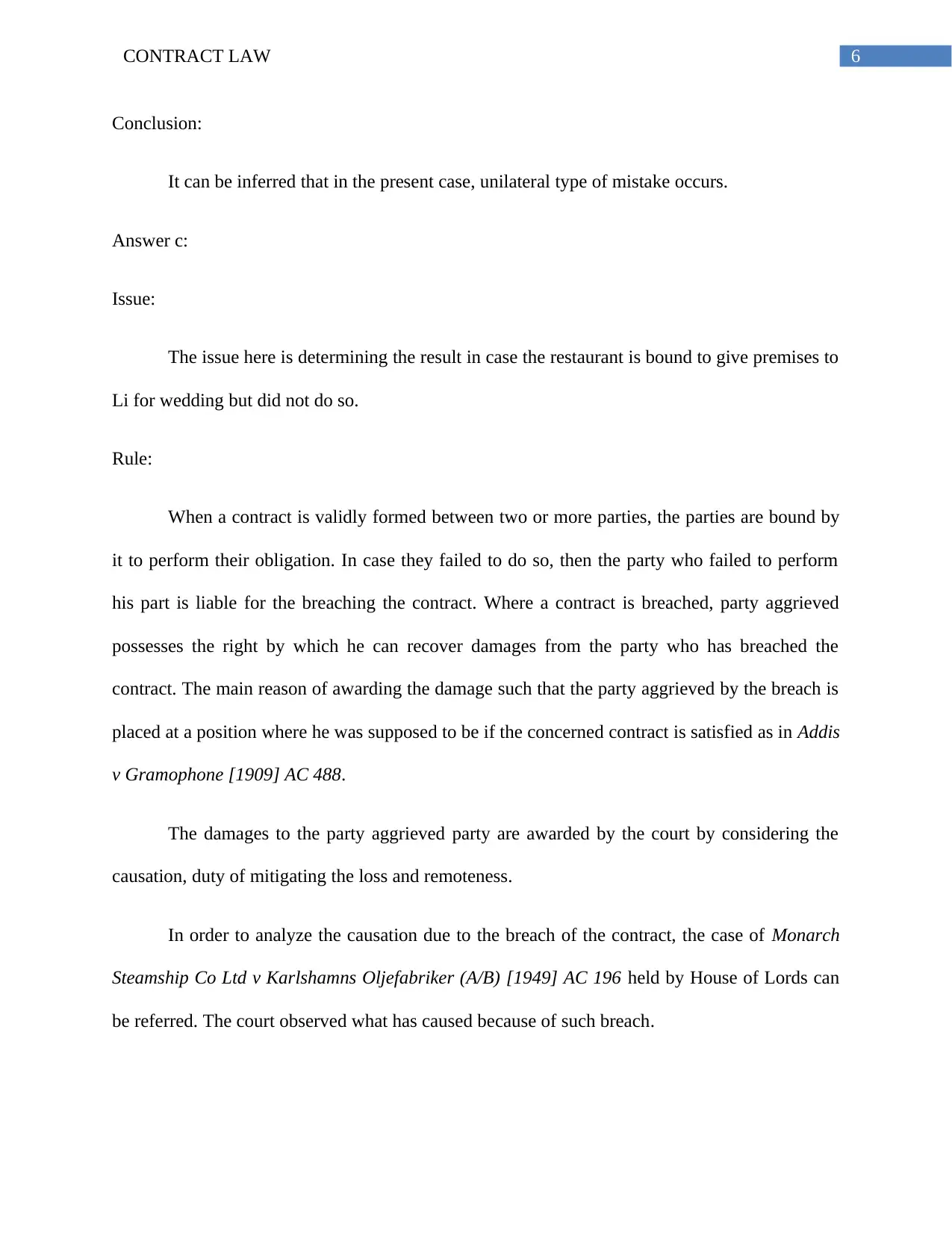
6CONTRACT LAW
Conclusion:
It can be inferred that in the present case, unilateral type of mistake occurs.
Answer c:
Issue:
The issue here is determining the result in case the restaurant is bound to give premises to
Li for wedding but did not do so.
Rule:
When a contract is validly formed between two or more parties, the parties are bound by
it to perform their obligation. In case they failed to do so, then the party who failed to perform
his part is liable for the breaching the contract. Where a contract is breached, party aggrieved
possesses the right by which he can recover damages from the party who has breached the
contract. The main reason of awarding the damage such that the party aggrieved by the breach is
placed at a position where he was supposed to be if the concerned contract is satisfied as in Addis
v Gramophone [1909] AC 488.
The damages to the party aggrieved party are awarded by the court by considering the
causation, duty of mitigating the loss and remoteness.
In order to analyze the causation due to the breach of the contract, the case of Monarch
Steamship Co Ltd v Karlshamns Oljefabriker (A/B) [1949] AC 196 held by House of Lords can
be referred. The court observed what has caused because of such breach.
Conclusion:
It can be inferred that in the present case, unilateral type of mistake occurs.
Answer c:
Issue:
The issue here is determining the result in case the restaurant is bound to give premises to
Li for wedding but did not do so.
Rule:
When a contract is validly formed between two or more parties, the parties are bound by
it to perform their obligation. In case they failed to do so, then the party who failed to perform
his part is liable for the breaching the contract. Where a contract is breached, party aggrieved
possesses the right by which he can recover damages from the party who has breached the
contract. The main reason of awarding the damage such that the party aggrieved by the breach is
placed at a position where he was supposed to be if the concerned contract is satisfied as in Addis
v Gramophone [1909] AC 488.
The damages to the party aggrieved party are awarded by the court by considering the
causation, duty of mitigating the loss and remoteness.
In order to analyze the causation due to the breach of the contract, the case of Monarch
Steamship Co Ltd v Karlshamns Oljefabriker (A/B) [1949] AC 196 held by House of Lords can
be referred. The court observed what has caused because of such breach.
Paraphrase This Document
Need a fresh take? Get an instant paraphrase of this document with our AI Paraphraser
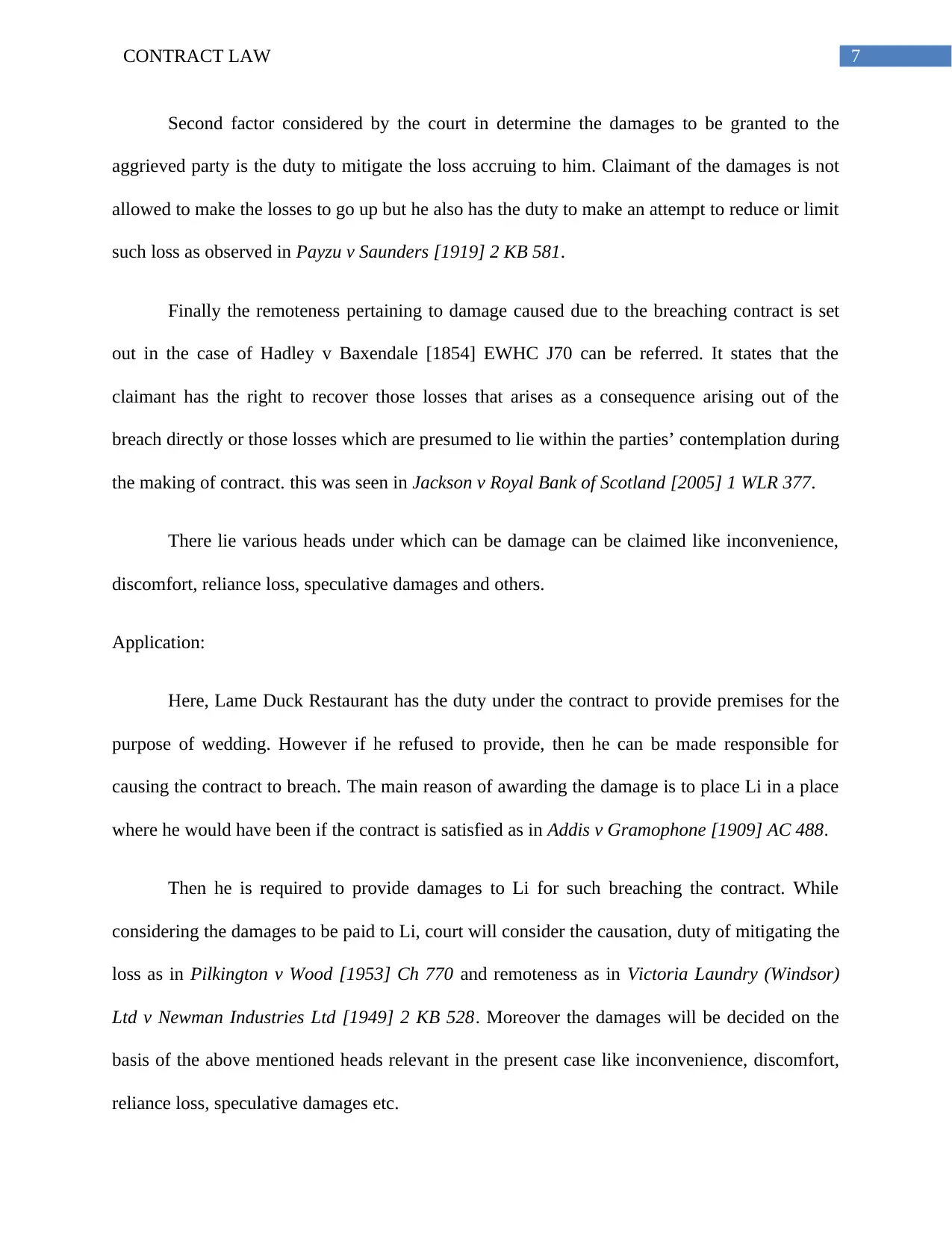
7CONTRACT LAW
Second factor considered by the court in determine the damages to be granted to the
aggrieved party is the duty to mitigate the loss accruing to him. Claimant of the damages is not
allowed to make the losses to go up but he also has the duty to make an attempt to reduce or limit
such loss as observed in Payzu v Saunders [1919] 2 KB 581.
Finally the remoteness pertaining to damage caused due to the breaching contract is set
out in the case of Hadley v Baxendale [1854] EWHC J70 can be referred. It states that the
claimant has the right to recover those losses that arises as a consequence arising out of the
breach directly or those losses which are presumed to lie within the parties’ contemplation during
the making of contract. this was seen in Jackson v Royal Bank of Scotland [2005] 1 WLR 377.
There lie various heads under which can be damage can be claimed like inconvenience,
discomfort, reliance loss, speculative damages and others.
Application:
Here, Lame Duck Restaurant has the duty under the contract to provide premises for the
purpose of wedding. However if he refused to provide, then he can be made responsible for
causing the contract to breach. The main reason of awarding the damage is to place Li in a place
where he would have been if the contract is satisfied as in Addis v Gramophone [1909] AC 488.
Then he is required to provide damages to Li for such breaching the contract. While
considering the damages to be paid to Li, court will consider the causation, duty of mitigating the
loss as in Pilkington v Wood [1953] Ch 770 and remoteness as in Victoria Laundry (Windsor)
Ltd v Newman Industries Ltd [1949] 2 KB 528. Moreover the damages will be decided on the
basis of the above mentioned heads relevant in the present case like inconvenience, discomfort,
reliance loss, speculative damages etc.
Second factor considered by the court in determine the damages to be granted to the
aggrieved party is the duty to mitigate the loss accruing to him. Claimant of the damages is not
allowed to make the losses to go up but he also has the duty to make an attempt to reduce or limit
such loss as observed in Payzu v Saunders [1919] 2 KB 581.
Finally the remoteness pertaining to damage caused due to the breaching contract is set
out in the case of Hadley v Baxendale [1854] EWHC J70 can be referred. It states that the
claimant has the right to recover those losses that arises as a consequence arising out of the
breach directly or those losses which are presumed to lie within the parties’ contemplation during
the making of contract. this was seen in Jackson v Royal Bank of Scotland [2005] 1 WLR 377.
There lie various heads under which can be damage can be claimed like inconvenience,
discomfort, reliance loss, speculative damages and others.
Application:
Here, Lame Duck Restaurant has the duty under the contract to provide premises for the
purpose of wedding. However if he refused to provide, then he can be made responsible for
causing the contract to breach. The main reason of awarding the damage is to place Li in a place
where he would have been if the contract is satisfied as in Addis v Gramophone [1909] AC 488.
Then he is required to provide damages to Li for such breaching the contract. While
considering the damages to be paid to Li, court will consider the causation, duty of mitigating the
loss as in Pilkington v Wood [1953] Ch 770 and remoteness as in Victoria Laundry (Windsor)
Ltd v Newman Industries Ltd [1949] 2 KB 528. Moreover the damages will be decided on the
basis of the above mentioned heads relevant in the present case like inconvenience, discomfort,
reliance loss, speculative damages etc.
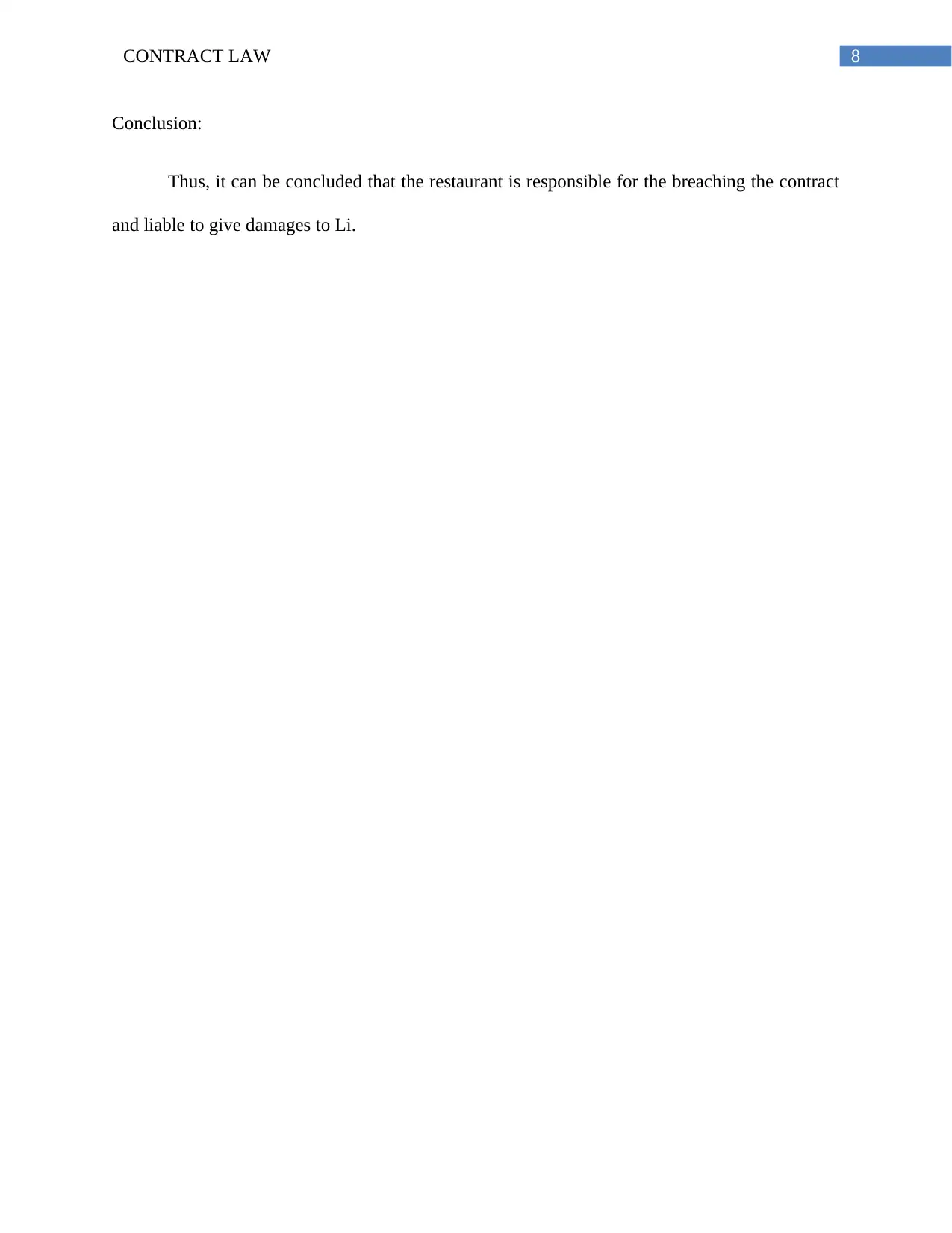
8CONTRACT LAW
Conclusion:
Thus, it can be concluded that the restaurant is responsible for the breaching the contract
and liable to give damages to Li.
Conclusion:
Thus, it can be concluded that the restaurant is responsible for the breaching the contract
and liable to give damages to Li.
⊘ This is a preview!⊘
Do you want full access?
Subscribe today to unlock all pages.

Trusted by 1+ million students worldwide
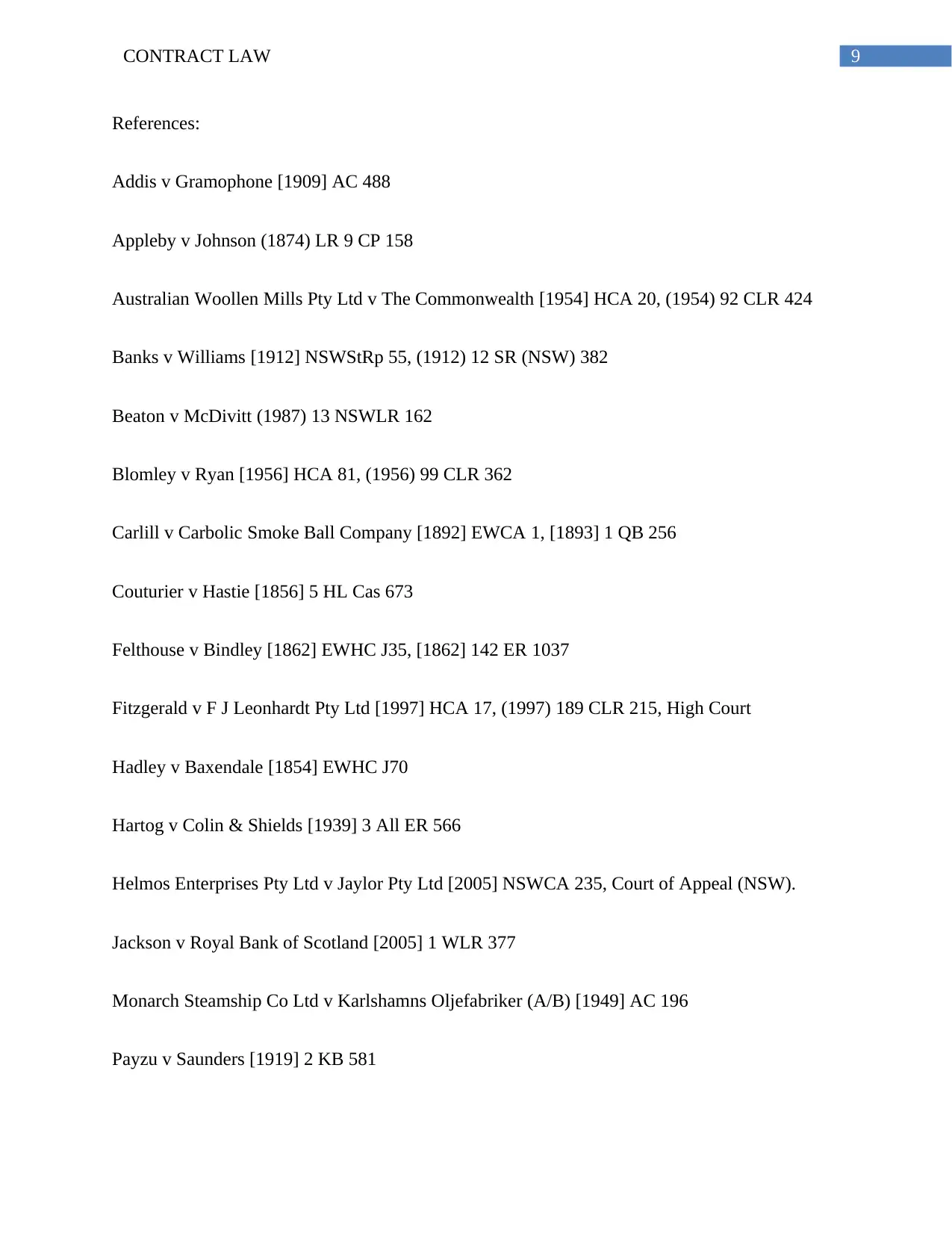
9CONTRACT LAW
References:
Addis v Gramophone [1909] AC 488
Appleby v Johnson (1874) LR 9 CP 158
Australian Woollen Mills Pty Ltd v The Commonwealth [1954] HCA 20, (1954) 92 CLR 424
Banks v Williams [1912] NSWStRp 55, (1912) 12 SR (NSW) 382
Beaton v McDivitt (1987) 13 NSWLR 162
Blomley v Ryan [1956] HCA 81, (1956) 99 CLR 362
Carlill v Carbolic Smoke Ball Company [1892] EWCA 1, [1893] 1 QB 256
Couturier v Hastie [1856] 5 HL Cas 673
Felthouse v Bindley [1862] EWHC J35, [1862] 142 ER 1037
Fitzgerald v F J Leonhardt Pty Ltd [1997] HCA 17, (1997) 189 CLR 215, High Court
Hadley v Baxendale [1854] EWHC J70
Hartog v Colin & Shields [1939] 3 All ER 566
Helmos Enterprises Pty Ltd v Jaylor Pty Ltd [2005] NSWCA 235, Court of Appeal (NSW).
Jackson v Royal Bank of Scotland [2005] 1 WLR 377
Monarch Steamship Co Ltd v Karlshamns Oljefabriker (A/B) [1949] AC 196
Payzu v Saunders [1919] 2 KB 581
References:
Addis v Gramophone [1909] AC 488
Appleby v Johnson (1874) LR 9 CP 158
Australian Woollen Mills Pty Ltd v The Commonwealth [1954] HCA 20, (1954) 92 CLR 424
Banks v Williams [1912] NSWStRp 55, (1912) 12 SR (NSW) 382
Beaton v McDivitt (1987) 13 NSWLR 162
Blomley v Ryan [1956] HCA 81, (1956) 99 CLR 362
Carlill v Carbolic Smoke Ball Company [1892] EWCA 1, [1893] 1 QB 256
Couturier v Hastie [1856] 5 HL Cas 673
Felthouse v Bindley [1862] EWHC J35, [1862] 142 ER 1037
Fitzgerald v F J Leonhardt Pty Ltd [1997] HCA 17, (1997) 189 CLR 215, High Court
Hadley v Baxendale [1854] EWHC J70
Hartog v Colin & Shields [1939] 3 All ER 566
Helmos Enterprises Pty Ltd v Jaylor Pty Ltd [2005] NSWCA 235, Court of Appeal (NSW).
Jackson v Royal Bank of Scotland [2005] 1 WLR 377
Monarch Steamship Co Ltd v Karlshamns Oljefabriker (A/B) [1949] AC 196
Payzu v Saunders [1919] 2 KB 581
Paraphrase This Document
Need a fresh take? Get an instant paraphrase of this document with our AI Paraphraser
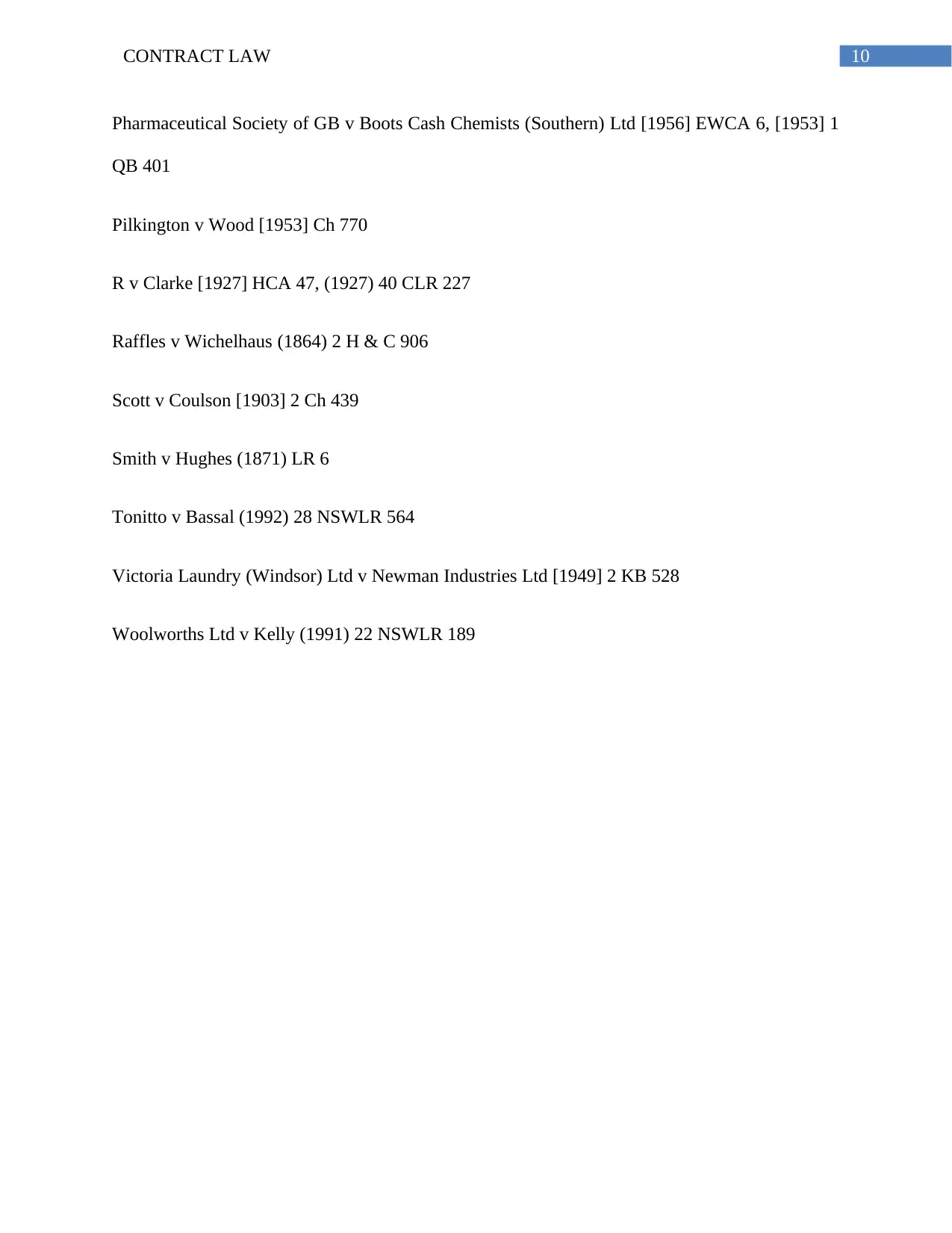
10CONTRACT LAW
Pharmaceutical Society of GB v Boots Cash Chemists (Southern) Ltd [1956] EWCA 6, [1953] 1
QB 401
Pilkington v Wood [1953] Ch 770
R v Clarke [1927] HCA 47, (1927) 40 CLR 227
Raffles v Wichelhaus (1864) 2 H & C 906
Scott v Coulson [1903] 2 Ch 439
Smith v Hughes (1871) LR 6
Tonitto v Bassal (1992) 28 NSWLR 564
Victoria Laundry (Windsor) Ltd v Newman Industries Ltd [1949] 2 KB 528
Woolworths Ltd v Kelly (1991) 22 NSWLR 189
Pharmaceutical Society of GB v Boots Cash Chemists (Southern) Ltd [1956] EWCA 6, [1953] 1
QB 401
Pilkington v Wood [1953] Ch 770
R v Clarke [1927] HCA 47, (1927) 40 CLR 227
Raffles v Wichelhaus (1864) 2 H & C 906
Scott v Coulson [1903] 2 Ch 439
Smith v Hughes (1871) LR 6
Tonitto v Bassal (1992) 28 NSWLR 564
Victoria Laundry (Windsor) Ltd v Newman Industries Ltd [1949] 2 KB 528
Woolworths Ltd v Kelly (1991) 22 NSWLR 189
1 out of 11
Related Documents
Your All-in-One AI-Powered Toolkit for Academic Success.
+13062052269
info@desklib.com
Available 24*7 on WhatsApp / Email
![[object Object]](/_next/static/media/star-bottom.7253800d.svg)
Unlock your academic potential
Copyright © 2020–2025 A2Z Services. All Rights Reserved. Developed and managed by ZUCOL.




